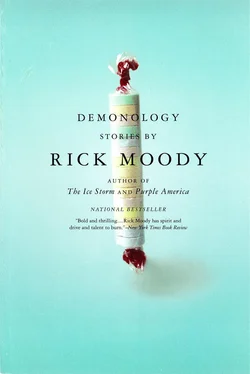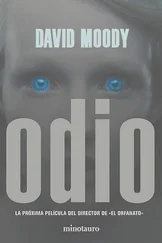Praise for Rick Moody’s Demonology
“Bold and thrilling…. Accomplished, fearless short stories that examine the exchange of energy between language and loss…. Moody does nothing in half measures. He places us under arrest before he reads us our rights…. Demonology rants and raves and roars.”
— Walter Kirn, New York Times Book Review
“Demonology mesmerizes the reader…. Moody is among the best in contemporary fiction.… He himself seems to be reaching new heights of inventiveness, writing convincingly and poignantly about the bizarre and the mundane, often combined in a single character.”
— Benjamin E. Lytal, Harvard Crimson
“A self-styled avenging angel of highbrow literary cool…. With fictionalizing father figures like Robert Coover and Thomas Pynchon and cohorts like David Foster Wallace, Donald Antrim, and Jeffrey Eugenides, Rick Moody is one of a small phalanx of sardonic post-post-modernists to have advanced boldly out of the early 1990s with pens drawn…. The much lauded title story is exceptional, heartbreaking…. The stories in Demonology range from hilarious to bitterly charming to quietly clever.” —Lydia Millet, Village Voice
“Impressive…. Demonology is a howling visitation of various psychic hells with a derisive laugh track…. The real pleasure is in the satiric audacity of the short-story form.”
— Peter Bricklebank, Chicago Tribune
“Moody’s best work is in Demonology, … It is well worth reading.”
— Daniel Handler, Newsday
“This fine collection confirms Rick Moody’s status as one of the stars of contemporary American fiction…. Each story shares a remorseless eye for detail, a comic turn of phrase, and a vision in which tragedy and banality are closely intertwined…. He’s a formidable talent, and Demonology finds him at his wicked, wonderful best.”
— John Tague, Independent on Sunday
“Moody writes eloquently and perceptively…. The prose breaks through the personal-loss cliche, reaching toward, and grasping, the unflinchingly and the painfully beautiful.”
— Michael Pelusi, Philadelphia City Paper
“Rick Moody has grown in stature due to his ability to portray inner life.… He is in the big leagues of modern fiction writers…. Like David Foster Wallace, Moody’s technical knowledge and command of the craft of writing is unquestioned.”
— Tim C. Davis, Creative Loafing
“In Demonology Rick Moody portrays the human condition as a disturbing, hilarious carnival of voices.”
— Michael Gross, Talk
The Chicken Mask was sorrowful, Sis. The Chicken Mask was supposed to hustle business. It was supposed to invite the customer to gorge him or herself within our establishment. It was supposed to be endearing and funny. It was supposed to be an accurate representation of the featured item on our menu. But, Sis, in a practical setting, in test markets — like right out in front of the restaurant — the Chicken Mask had a plaintive aspect, a blue quality (it was stifling, too, even in cold weather), so that I’d be walking down Main, by the waterfront, after you were gone, back and forth in front of Hot Bird (Bucket of Drumsticks, $2.99), wearing out my imitation basketball sneakers from Wal-Mart, pudgy in my black jogging suit, lurching along in the sandwich board, and the kids would hustle up to me, tugging on the wrists of their harried, underfinanced moms. The kids would get bored with me almost immediately. They knew the routine. Their eyes would narrow, and all at once there were no secrets here in our town of service-economy franchising: Iwas the guy working nine to five in a Chicken Mask, even though I’d had a pretty good education in business administration, even though I was more or less presentable and well-spoken, even though I came from a good family. I made light of it, Sis, I extemporized about Hot Bird, in remarks designed by virtue of my studies in business tactics to drive whole families in for the new low-fat roasters, a meal option that was steeper, in terms of price, but tasty nonetheless. (And I ought to have known, because I ate from the menu every day. Even the coleslaw.)
Here’s what I’d say, in my Chicken Mask. Here was my pitch: Feeling a little peckish? Try Hot Bird! Or Don’t be chicken, try Hot Bird! The mothers would laugh their nervous adding-machine laughs (those laughs that are next door over from a sob), and they would lead the kids off. Twenty yards away, though, the boys and girls would still be staring disdainfully at me, gaping backward while I rubbed my hands raw in the cold, while I breathed the synthetic rubber interior of the Chicken Mask — that fragrance of rubber balls from gym classes past, that bouquet of the gloves Mom used for the dishes — while I looked for my next shill. I lost almost ninety days to the demoralization of the Chicken Mask, to its grim, existential emptiness, until I couldn’t take it anymore. Which happened to be the day when Alexandra McKinnon (remember her? from Sunday school?) turned the corner with her boy Zack — he has to be seven or eight now — oblivious while upon her daily rounds, oblivious and fresh from a Hallmark store. It was nearly Valentine’s Day. They didn’t know it was me in there, of course, inside the Chicken Mask. They didn’t know I was the chicken from the basement, the chicken of darkest nightmares, or, more truthfully, they didn’t know I was a guy with some pretty conflicted attitudes about things. That’s how I managed to apprehend Zack, leaping out from the in-door of Cohen’s Pharmacy, laying ahold of him a little too roughly, by the hem of his pillowy, orange ski jacket. Little Zack was laughing, at first, until, in a voice wracked by loss, I worked my hard sell on him, declaiming stentoriously that Death Comes to All. That’s exactly what I said, just as persuasively as I had once hawked White meat breasts, eight pieces, just $4.59! Loud enough that he’d be sure to know what I meant. His look was interrogative, quizzical. So I repeated myself. Death Comes to Everybody, Zachary. My voice was urgent now. My eyes bulged from the eyeholes of my standard-issue Chicken Mask. I was even crying a little bit. Saline rivulets tracked down my neck. Zack was terrified.
What I got next certainly wasn’t the kind of flirtatious attention I had always hoped for from his mom. Alex began drumming on me with balled fists. I guess she’d been standing off to the side of the action previously, believing that I was a reliable paid employee of Hot Bird. But now she was all over me, bruising me with wild swings, cursing, until she’d pulled the Chicken Mask from my head — half expecting, I’m sure, to find me scarred or hydrocephalic or otherwise disabled. Her denunciations let up a little once she was in possession of the facts. It was me, her old Sunday school pal, Andrew Wakefield. Not at the top of my game.
I don’t really want to include here the kind of scene I made, once unmasked. Alex was exasperated with me, but gentle anyhow. I think she probably knew I was in the middle of a rough patch. People knew. The people leaning out of the storefronts probably knew. But, if things weren’t already bad enough, I remembered right then — God, this is horrible — that Alex’s mom had driven into Lake Sacan-daga about five years before. Jumped the guardrail and plunged right off that bridge there. In December. In heavy snow. In a Ford Explorer. That was the end of her. Listen, Alex, I said, I’m confused, I have problems and I don’t know what’s come over me and I hope you can understand, and I hope you’ll let me make it up to you. I can’t lose this job. Honest to God. Fortunately, just then, Zack became interested in the Chicken Mask. He swiped the mask from his mom — she’d been holding it at arm’s length, like a soiled rag — and he pulled it down over his head and started making simulated automatic-weapons noises in the directions of local passersby. This took the heat off. We had a laugh, Alex and I, and soon the three of us had repaired to Hot Bird itself (it closed four months later, like most of the businesses on that block) for coffee and biscuits and the chefs special spicy wings, which, because of my position, were on the house.
Читать дальше












